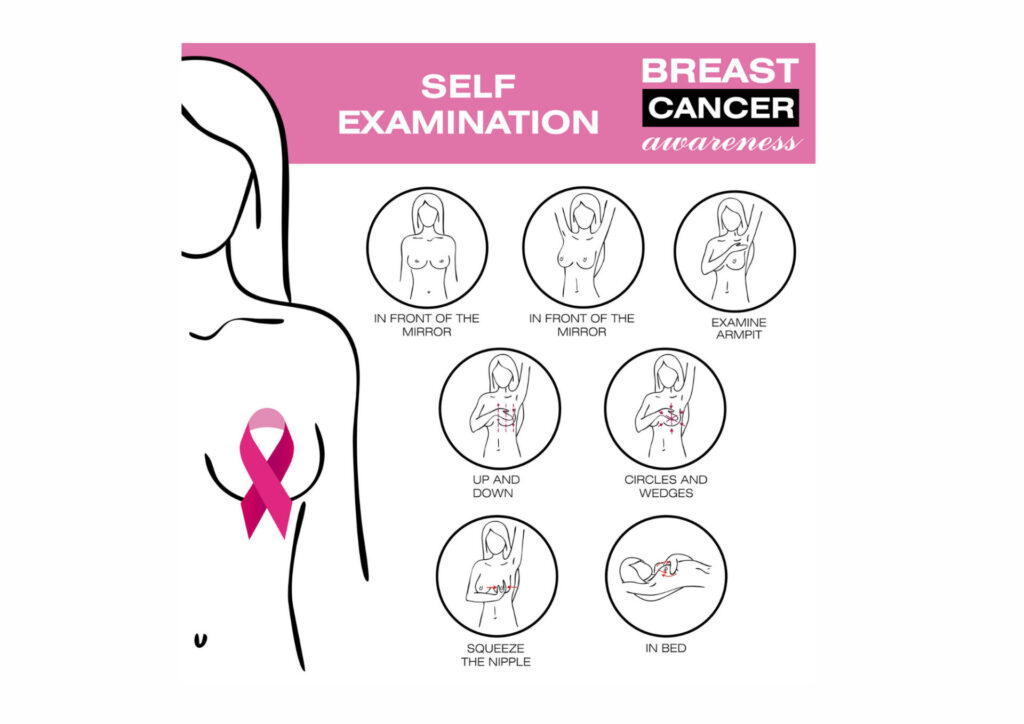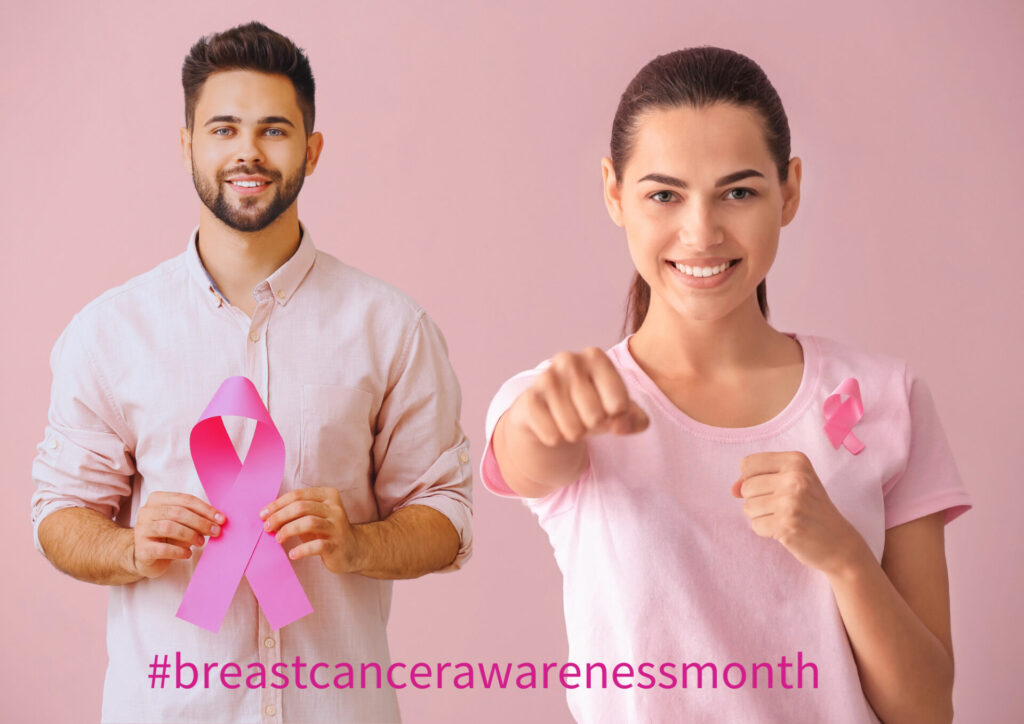Raising Awareness: Breast Cancer in Men and Women
Breast cancer, a disease often perceived as affecting only women, is, in fact, a threat to all genders. Consider this fact: breast cancer knows no gender boundaries. In Australia, approximately 212 men will be diagnosed with breast cancer and 20,458 women in 2023, according to Breast Cancer Network Australia. While women account for most breast cancer cases, it is critical to recognise that men are also vulnerable to this disease.
Breast Cancer Awareness Month holds a significant place on Australia’s healthcare calendar, with numerous organisations, healthcare professionals, survivors, and advocates coming together to emphasise the importance of breast health education. It presents an opportunity to transcend traditional gender roles and acknowledge that breast cancer affects people of all genders, earning our attention and action.
In this blog, we delve deeper into the reality of breast cancer’s presence in both men and women in Australia, exploring shared risk factors, symptoms, and the necessity of gender-inclusive awareness initiatives. By the conclusion of this journey, we hope you will pay attention to the call to challenge stereotypes, foster collaboration, and ultimately contribute to saving lives in Australia.
Breast Cancer around the world
Breast cancer transcends geographical boundaries, affecting people worldwide. It is a global health concern that touches lives in practically every corner of the globe. It’s essential to recognise its impact on a worldwide scale to understand the significance of breast cancer awareness.
Breast cancer is the most commonly diagnosed cancer among women globally. According to the World Health Organisation, there were an estimated 2.3 million new cases of female breast cancer in 2022. But the numbers don’t stop there. Breast cancer affects men, with approximately 130,000 worldwide diagnosed with breast cancer in 2022.
While breast cancer is a global issue, its prevalence and outcomes vary widely by region. Developed countries tend to have higher rates of breast cancer diagnosis, often due to better healthcare infrastructure and early detection efforts. In contrast, in low- and middle-income countries, where resources and access to healthcare are limited, breast cancer often goes undiagnosed until advanced stages.
International efforts like organisations such as the World Health Organization (WHO) and international cancer societies work tirelessly to reduce the weight of breast cancer worldwide. They provide guidelines for breast cancer screening, advocate for better access to healthcare, and support research initiatives to improve prevention and treatment.
Shared risk factors and symptoms of Breast Cancer
Breast cancer doesn’t discriminate when it comes to risk factors. There are commonalities in the factors that increase the risk of breast cancer for both men and women.
These shared risk factors include:






Early detection is the key to fight against Breast cancer.
The battle against breast cancer is a battle best fought early. Regardless of gender; early detection significantly improves the chances of successful treatment and survival. Breast cancer awareness campaigns emphasise the importance of regular screenings for breast cancer for both men and women.
Statistics consistently highlight the benefits of early detection. When breast cancer is detected at an early, localised stage, the five-year survival rate can exceed 90% for both genders. Regular screenings play a pivotal role in achieving these favourable outcomes.
For women, regular mammograms are the gold standard for breast cancer screening. Mammograms can detect tumours before they become palpable as lumps. Early detection enables prompt intervention, potentially preventing the cancer from spreading.
For men, clinical breast exams by healthcare professionals can be invaluable. Men should be proactive about discussing breast health with their doctors, especially if they have risk factors such as a family history of breast cancer.
“Regular screenings are not about gender but about early intervention and saving lives”

Engaging in Australia’s Breast Cancer Awareness Campaign
October is recognised for being Breast Cancer Awareness Month. It serves as an ideal time to get involved and make a positive impact in the fight against breast cancer in Australia.
How to get involved in Breast Cancer awareness
Whether you’re looking to contribute, raise awareness, or show support, there are numerous ways to participate in the campaign. Here are a few ideas:
Fundraising Events
Participate in or organise fundraising events such as charity walks, runs, or cycling events. Many organisations in Australia host Breast Cancer Awareness Month events to raise funds for research, support services, and education.
Donations
Consider making a financial donation to reputable breast cancer organisations. Your contribution can support research efforts, patient care, and awareness campaigns.
Volunteer
Many breast cancer charities and support groups in Australia rely on volunteers. You can offer your time and skills to help with events, support groups, or administrative tasks.
Educate Yourself
Stay informed about breast cancer by accessing reliable resources and keeping up-to-date with the latest advancements in research and treatment. Talk to your friends and family about breast cancer and encourage them to get screened.
Get screened
If you are a woman over 40 or a man aged 60, talk to your doctor about getting a mammogram. Mammograms are the best way to detect breast cancer early when it is most treatable. However, it’s important to note that breast cancer in men or women can occur at any age.

Leading Australian Organisations fighting Breast Cancer
Some of the most recognisable and prominent Australian organisations dedicated to breast cancer awareness, research, and support include:
Cancer Australia:
As the Australian Government’s national cancer agency, Cancer Australia is pivotal in coordinating breast cancer awareness efforts, research initiatives, and patient support services.
National Breast Cancer Foundation (NBCF)
NBCF is one of the leading nonprofit organisations in Australia dedicated to funding breast cancer research. They are known for its Pink Ribbon campaign and extensive efforts to raise awareness and support innovative research projects.
Breast Cancer Network Australia (BCNA)
BCNA is a well-known advocacy and support organisation for Australians affected by breast cancer. They provide vital information, support, and resources to patients, survivors, and their families.
Cancer Council Australia
While not exclusive to breast cancer, the Cancer Council is a significant organization that offers a wealth of information on cancer prevention, early detection, and support services, including those related to breast cancer. The Cancer Council Australia has eight state and territory divisions (NSW, VIC, QLD, SA, WA, TAS, ACT, NT). Each state division has its own website and services to the local community.
McGrath Foundation
The McGrath Foundation, was founded by Australian cricketing legend Glenn McGrath and his late wife Jane. It is renowned for its breast care nurses program, which provides support and care to individuals diagnosed with breast cancer.
A few things to keep in mind about Breast cancer
Breast cancer in men is less common than in women, but it does not mean they are immune to it.
Men are often diagnosed at a later stage than women. This is because men are less likely to be aware of the symptoms of breast cancer and are less likely to seek medical attention.
For both genders, perform regular breast self-exams and see your doctor for regular checkups. The importance of early detection definitely will make a difference.
Breast cancer affects all women and men, young and old.
Breast cancer awareness is a lifelong commitment to our health and the well-being of our loved ones.
In Australia and worldwide, organisations tirelessly work to improve research, support services, and patient care. Donations have a high impact in many ways; for instance, financial donations are pivotal in advancing our understanding of the disease and developing more effective treatments.
Offer unwavering support to those facing this battle. Remember, it’s not just about awareness; it’s about action. Breast cancer is not only treatable but preventable.

About Rocket Remit
Rocket Remit is the world’s fastest international money transfer service. Send money instantly to over 50 overseas countries at very competitive rates.
Use the country selector to choose the country and check the rate.
Click here for more information on how to send money using Rocket Remit.